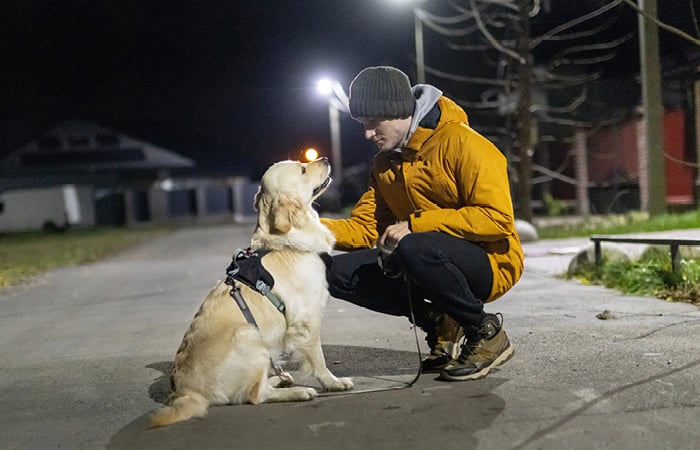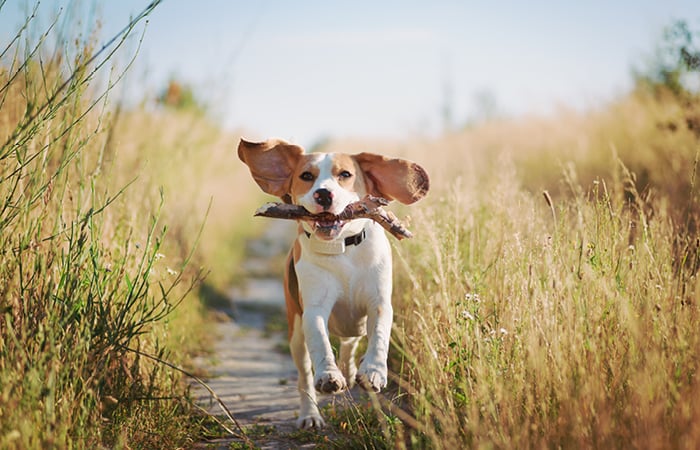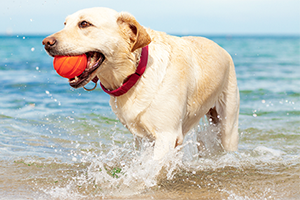Dog travel checklist

Quick Links
Should you take your dog on holiday?

Before taking your dog on holiday
Even if your dog loves to travel, you’ll need to check if your destination welcomes dogs. If you’re planning on travelling abroad, you’ll need the right paperwork prepared in plenty of time before you leave. Here’s what you’ll need to do:
- At least one month before you travel, check what paperwork and medications your dog will need. Ensure all vaccinations, including rabies if necessary, are up to date.
- Make sure your dog’s microchip details are up to date.
- Check your insurance is up to date. With Petplan dog insurance, your dog is covered for trips within the EU – but check your terms and conditions for full details.
- Arrange for your vet to issue a health certificate for travel abroad. This is only valid for 10 days, so make sure you’ll be travelling within that time frame.
- Get a spare ID tag with your holiday address and contact details. Use this while you’re away.
- If your dog is on any medication, make sure you have enough to last the trip.
- Check that your accommodation accepts pets, and what supplies will be provided.
- Look up local vets, including one with an out-of-hours service for emergencies.
If you have dog insurance with Petplan, you can also use the Pet Expert Chat feature to speak with an expert, 24/7. Log in to your My Petplan account and go to the MySupport area.

Travelling with a dog
Car
Make sure your dog is comfortable with shorter car trips before planning a long journey. Many dogs can suffer from travel sickness, so ask your vet about anti-sickness treatments, and avoid feeding your dog for two to three hours before a journey.
The Highway Code states dogs must be suitably restrained, either with a pet seatbelt, car harness, dog guard or crate. Make sure you train your dog to be comfortable travelling using your chosen method, as some can take a bit of getting used to.
Don’t let your dog stick their head out of the window, as this can cause injuries. Remember to stop regularly for toilet breaks and let your dog stretch their legs. Never leave your dog alone in the car, even for a minute.
When travelling, make sure your dog has access to water, and give them food during breaks if you’re on a longer trip. Bringing your dog’s favourite blanket for them to lie on can help them feel more comfortable en route.
Plane
Train
In the UK, you can usually travel with up to two dogs for no extra charge, as long as you follow the operator’s regulations. Before your holiday, take the time to acclimate your dog to trains by taking a few shorter trips. If your dog isn’t behaving, you may be refused entry.
Always keep large dogs on a lead, and small dogs in a carrier if possible. If you’re planning on using a sleeper train, check ahead that dogs are allowed.
Can dogs go on the Eurostar?
Ferry
Many ferries offer dog-friendly cabins and areas of the deck where you can take your dog for short walks. These cabins tend to get booked well in advance, so be sure to plan ahead.
Avoid using ferries that require you to leave your dog in the car for the duration of the trip, as this is very stressful for them, so not recommended.

Travelling with your dog to Europe and Northern Ireland
Tapeworm treatment
If you’re travelling to the below countries, your dog will need a tapeworm treatment before they leave:
- Ireland
- Northern Ireland
- Finland
- Malta
- Norway
You’ll need to book an appointment with your vet for this treatment. It needs to be administered between 24 hours and five days before travel and recorded on your dog’s AHC.
When returning to the UK from Europe, your dog will need another tapeworm treatment in the country you’re departing from. The only exclusions are if you’re travelling back from Finland, Ireland, Malta, Northern Ireland or Norway. Again, this needs to be administered between 24 hours and five days before you travel home. You’ll need to arrange this with a vet in the country you’re visiting, with the details being recorded on your dog’s AHC.
Rabies vaccination

Travelling outside the EU with your dog
Looking after your dog while on holiday
The sights, smells and sounds of a new destination can be exciting for dogs – but also unsettling. To make their trip as fun as possible, follow these tips:
- Pack familiar items that smell of home
- Bring a selection of your dog’s favourite toys
- Try to stick to the same routine for feeding and bed times, exercise and toilet breaks
- Keep your dog on the lead, unless you’re sure it’s safe to let them off
- Calming remedies like pheromone sprays can ease the stress of travel
- Bring enough dog food for the entire trip, if possible, as this will reduce the chance of your dog suffering from any gastrointestinal issues.
- Try not to leave your dog alone in an unfamiliar setting
- Check the local weather and be aware of summer hazards, unfamiliar wildlife, and parasites such as ticks and fleas.

Leaving your dog at home
Travel checklist
Before you leave, download and print this handy travel checklist to make sure you’ve packed these essential items:
- Collar and ID: Make sure these have your up-to-date contact details.
- Lead: It may be helpful to take a spare in case this gets lost or breaks.
- Dog carrier: If driving with dogs, you’ll need a harness, boot-guard, pet seat belt or carrier.
- Bedding: Taking your dog’s familiar bedding will help them settle into a new place.
- Poo bags: Kitchen roll and an enzymatic cleaner could also come in handy (as can a lint roller, to deal with fur on your accommodation’s soft furnishings).
- Dog food and bowl: Ideally enough for the duration of your trip.
- Plenty of treats: For rewarding good behaviour. A substantial chew or two (that’s appropriate to your dog’s age and dental development) can help them settle in a new environment.
- Collapsible bowl or travel water bottle: Handy on the move, and can double as a water bowl throughout your holiday.
- Towels: To dry wet and/or muddy fur and paws.
- First-aid kit/medications: Basic dog first-aid essentials, such as a tick remover, are always useful – plus any regular medicines your dog takes.
- Grooming kit: If you have a long-haired breed that needs regular grooming, don’t forget the necessary brushes and combs.
- Recent photo: Helpful if your dog gets lost on holiday.
- Documentation: Any required paperwork for travelling abroad, and your pet’s vet and insurance details.
Petplan is a trading name of Pet Plan Limited (Registered in England No. 1282939) and Allianz Insurance plc (Registered in England No. 84638), Registered office: 57 Ladymead, Guildford, Surrey GU1 1DB.
Pet Plan Limited is authorised and regulated by the Financial Conduct Authority. Financial Services Register No. 311969. Allianz Insurance plc is authorised by the Prudential Regulation Authority and regulated by the Financial Conduct Authority and the Prudential Regulation Authority. Financial Services Register No. 121849. Pet Plan Limited is a subsidiary of Allianz Insurance plc.














